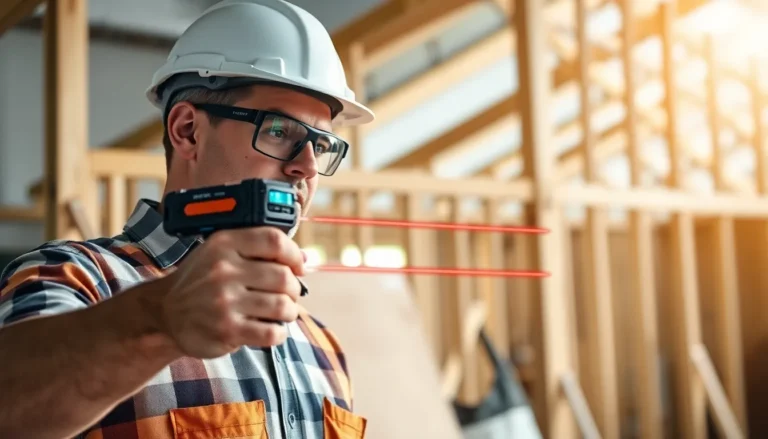Table of Contents
ToggleImagine walking into your home and having it greet you like an old friend. Smart home tech solutions make this dream a reality, turning ordinary spaces into extraordinary experiences. From voice-activated assistants to smart thermostats that know when you’re chilly, these gadgets transform daily life into a seamless blend of convenience and comfort.
Overview Of Smart Home Tech Solutions
Smart home technology encompasses a variety of devices designed to enhance comfort and convenience. Voice-activated assistants like Amazon Alexa and Google Assistant serve as central hubs, allowing seamless control of other smart gadgets. Smart thermostats, such as Nest and Ecobee, adjust temperatures based on occupancy, contributing to energy savings and comfort.
Lighting solutions, including Philips Hue and LIFX, enable users to customize ambiance easily, adjusting brightness and color through apps or voice commands. Home security systems, featuring cameras and smart locks, offer remote monitoring and heightened protection, enhancing peace of mind.
Smart appliances like refrigerators and washing machines can perform tasks autonomously, often activated via smartphone apps. Connected smoke detectors and carbon monoxide alarms provide real-time notifications, ensuring safety and alerting homeowners of potential hazards.
Integration of smart home devices allows users to create automated routines, optimizing daily tasks and improving energy management. Data from these devices can be analyzed to gain insights into energy consumption patterns, enabling smarter decisions regarding resource use.
Multiple manufacturing companies, including Samsung and Apple, contribute to the expanding ecosystem of smart home solutions. Market demand for these technologies continues to rise, indicating a shift towards more automated, connected living environments. Users benefit from convenience, increased efficiency, and improved safety through the adoption of smart home tech.
Benefits Of Smart Home Tech
Smart home tech solutions provide various benefits that enhance daily life and improve overall living conditions. Homeowners gain peace of mind, energy savings, and streamlined routines with these advancements.
Enhanced Security Features
Smart home technology strengthens security through advanced features. Users access real-time surveillance via connected cameras and alarms, ensuring safety. Integration with smartphone apps permits remote monitoring and control, which enhances response times during emergencies. Alerts for unusual activity keep homeowners informed, allowing them to act swiftly. Smart locks add another layer of security by enabling keyless entry options, facilitating controlled access for family and guests.
Energy Efficiency
Energy efficiency benefits significantly from smart home technology. Smart thermostats adjust heating and cooling based on occupancy, optimizing energy consumption. Users can track energy usage through analytic tools, identifying high usage patterns for cost reduction. Automated lighting systems turn off lights in unoccupied rooms, preventing unnecessary power waste. With smart appliances, homeowners can schedule running times during off-peak hours, further enhancing energy conservation and reducing utility bills.
Convenience And Automation
Convenience and automation transform daily tasks in a smart home environment. Voice-activated assistants command various devices, making interactions fast and seamless. Homeowners can set routines that automate specific tasks, like brewing coffee or adjusting lighting at particular times. Customized settings adapt to individual preferences, ensuring a tailored living experience. Smart appliances streamline chores, allowing for hands-free operation and freeing up time for other activities.
Types Of Smart Home Tech Solutions
Smart home tech solutions encompass a variety of devices designed to enhance daily living and improve efficiency. These gadgets address specific needs throughout the home.
Smart Lighting Systems
Smart lighting systems provide customizable control over home illumination. Users can adjust brightness and color temperature through mobile apps or voice commands. Brands like Philips Hue and LIFX allow for automation of schedules, enabling lights to turn on or off at specific times. Additionally, these systems can sync with security features, ensuring outdoor lights activate during suspicious activity. This level of control enhances both ambiance and security.
Smart Thermostats
Smart thermostats offer automated temperature control for optimal comfort. Devices like Nest and Ecobee learn user preferences and adjust heating or cooling accordingly. Energy-saving features include scheduling based on occupancy, which reduces unnecessary energy use. Remote access via smartphones enables users to monitor and modify settings from anywhere. These thermostats help cut down monthly utility bills while maintaining a pleasant indoor environment.
Smart Security Systems
Smart security systems enhance home safety through advanced technologies. Surveillance cameras, such as Ring and Arlo, allow homeowners to monitor property in real time. Smart locks provide keyless entry, which improves convenience and security. Additionally, motion sensors can trigger alerts on mobile devices when unusual activity is detected. These systems integrate easily with other smart devices, ensuring comprehensive protection.
Smart Appliances
Smart appliances simplify daily tasks and increase household efficiency. Devices like smart refrigerators and washing machines can be controlled remotely and offer notifications about their status. These appliances often feature energy-efficient modes, which contribute to lower electricity bills. Brands such as Samsung and LG design these products to integrate with home automation systems, making life hassle-free. Users can enjoy the benefits of technology while completing chores more effectively.
Choosing The Right Smart Home Tech
Selecting smart home technology requires careful consideration of multiple factors. Users must evaluate compatibility, budget, and the overall experience with devices.
Compatibility With Existing Systems
Compatibility is crucial when integrating new smart home tech. Devices should seamlessly work with existing systems, such as smart assistants or home networks. Check for interoperability with platforms like Google Home and Amazon Alexa. Research each device’s connectivity options, including Wi-Fi and Zigbee, to ensure smooth operation. Users often find devices that are compatible with multiple ecosystems offer greater flexibility and ease of use. This approach maximizes the potential of smart home environments while minimizing technical headaches.
Budget Considerations
Budget plays a significant role in choosing smart home tech solutions. It’s important to define how much one is willing to invest upfront and in ongoing expenses, such as monthly subscriptions for premium services. Many devices range from affordable options to high-end solutions with advanced features. Users must evaluate long-term savings against initial costs, particularly regarding energy-efficient products. Setting realistic spending limits helps in making informed choices and avoiding overspending on unnecessary gadgets.
User Experience And Support
User experience and support enhance satisfaction with smart home devices. A simple intuitive interface makes for easier navigation and control. Access to customer support is essential when encountering technical issues. Researching reviews and testimonials can provide insights into possible user experiences and common troubleshooting challenges. Selecting brands known for reliable support ensures a smoother transition to smart living. Prioritizing user experience leads to a more enjoyable interaction with technology and the home environment.
Smart home technology is revolutionizing the way people interact with their living spaces. By enhancing comfort security and energy efficiency it creates a more enjoyable and manageable home environment. As users increasingly embrace these innovations they can expect a seamless integration of devices that cater to their unique needs.
With a wide range of options available from trusted manufacturers individuals can customize their smart home experience. Prioritizing factors like compatibility budget and user experience ensures that homeowners make informed decisions. As the smart home ecosystem continues to evolve it promises to deliver even greater convenience and efficiency for years to come.







